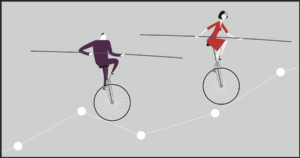Don’t cry because its over,
Smile because it happened.
Theodor Geisel aka Dr. Suess
Playing Poker

I recently played poker for the first time since I was in my twenties. I remembered that I had fun playing, which inspired me to join this friendly game. What I didn’t realize back then and discovered now was that poker is a metaphor for business.
The chorus of Kenny Roger’s celebrated song The Gambler sums it up well, “You got to know when to hold ’em, know when to fold ’em, know when to walk away.”
The thing is, it’s not just about the cards I hold; it’s about the cards on the table, the cards the other players hold, and the cards left to be dealt. And, of course, we only know the cards we hold and the ones visible on the table, right?
Wrong.
If you are a card counter, you may be able to anticipate the cards remaining to be dealt giving you an advantage. And, even if you aren’t a card counter, you can get a sense of what others are holding by what they say, don’t say, and their body language. It’s the same in our business relationships.
The challenge with poker and the challenge with business (actually life in general) is effectively making the hold ’em – fold ’em – walk away decision. Often, we make this decision solely from the point of view of the cards we hold, forgetting about the table, the cards the other person holds, and the cards left to be dealt.
Recently, a client shared a story with me that, in telling, we both realized was a real-life poker table. A year or so ago, my client started a side business with a partner. As often happens with partnerships, my client came to realize that the partner wasn’t adding the value expected and the business was not taking off. My client had been talking for some time about how to unwind the partnership when suddenly, the partner provided an out. The partner apparently was also concerned and told my client, “We need to make a go/no go decision in 30 days”.
At first, my client was taken aback, didn’t see it as an out, and was inclined to confront her partner and force the issue of dissolution. That was until we talked about it, and we both realized this was a golden opportunity to hold ’em. The probability of anything changing in 30 days was low, giving my client, if she was willing to be patient, the opportunity to walk away a winner.
Leadership Quote: The return we reap…
The return we reap from generous actions is not always evident.
Francesco Guicciardini, Italian historian, statesman and political writer of the Italian Renaissance.
When Are We Old? What Does it Mean To Be Old?

As the baby boomer population ages, rarely does a day go by without several news articles about how to stay fit, keep your brain active, and stave off the ills of aging. At the same time, millennials are also aging and entering middle age.
Speaking of middle age, my doctor says we are middle-aged until 85.
So what does all this mean?
- Does it mean the middle part of life is longer?
- Or does it mean the later part of life is longer?
- How much is choice? How much is dictated by genetics and health?
- Does this mean we continue our careers longer? Or do we change careers in mid-middle age or early middle age? Or do we choose an encore career or an encore life?
- What about retirement? Is it still an option for most people? Is it a privilege, a desire, or a destiny without choice?
I suspect the answer to all these questions is “It depends.” At the same time, it might be worth pausing to ask ourselves these questions.
All We Are Saying…
Earlier this week, I read in the news that relatives of the late civil rights leader Martin Luther King Jr are making a rare trip to Memphis on Thursday, on the anniversary of his assassination, to speak on the rising threat of political violence, especially in an election year.
Relatives of King do not generally make the pilgrimage to Memphis, and certainly not as a family unit, but have said they felt it was necessary to do so during a presidential election year in which the US is so divided and violent rhetoric is becoming routine. “This is the first year that we are going back as a family to Memphis, and we felt that it was extraordinarily important to be there in that spot this year,” King III’s wife, Andrea Waters King, told Axios.
Reading this story, combined with the physical and verbal vitriol in our cities and the terrible wars worldwide, brought to mind John Lennon’s song, Give Peace A Chance.
The refrain from Lennon’s song, “All we are saying is give peace a chance,” became an anthem for the baby boomers during the turbulent 60’s and early 70’s.
Perhaps it is time to start singing it again.
What Is a Big Deal To Me, May Leave You Wondering WTF

In this increasingly sensitized world, we sometimes wonder how others will interpret our words.
On the receiving end, we may be offended by others’ comments and wonder, at a minimum, how this person could have been so insensitive.
Layer on to these differences in cultures and life experiences; while some may hear a comment as a big deal, the sender may be left scratching their head.
For me, the solution lies in dialogue and seeking first to understand. Understand what others are sensitive to, the life and ancestral experiences that may have led them to feel as they do, and why others appear to “not get it.”
Two conversations, one recent and one I had a few years back, brought this home to me at a personal level. In the recent conversation, as a Jewish person, I felt offended by comments I heard from a friend—comments that my friend may have felt were neutral.
This recent experience reminded me of a conversation a few years ago with a black friend when I was perceived as insensitive. “You don’t understand my history and lived experience,” she said. I felt sad and misunderstood at the time because I thought I did understand. I realize now that her comments were accurate; I do not understand. Each of us sees the world through our filter.
Sometimes, we think what is right and what is wrong should be obvious, yet it often isn’t. One of my favorite examples comes from Trevor Noah’s biography.
According to Noah, in South Africa, where he is from, children are taught that Hitler was a powerful man; the atrocities he committed were left out of the history lesson. Trevor goes on to say that black South Africans often name their children after “great leaders,” emphasizing that great does not necessarily mean good. With this background in mind, Noah shares a story about a friend named Hitler. Yes, that is his given name, not a nickname.
As young adults, Trevor and Hitler were entertainers; Trevor was a DJ, and Hitler was a dancer. The two of them were invited to perform at a school in a white neighborhood that turned out also to be a Jewish neighborhood. When Trevor introduces Hitler to the stage to dance, the room falls silent. Trevor doesn’t understand why and carries on with his spiel using Hitler’s name over and over.
Finally, a teacher comes on stage and demands that they leave. An argument ensues; the teacher is horrified that “you people” had the indecency to come here. Trevor hears “you people” as black people; now both are horrified and offended. Trevor and Hitler leave, and it isn’t until years later, when Trevor travels outside of South Africa, that he understands what happened that day.
When I read Noah’s story, I was struck by its absurdity and reminded that we must try to assume positive intent, which is hard to do sometimes but so important, especially today.
Leadership Quote: The more you invest…
The more you invest in a set of beliefs—the greater the sacrifice you make in the service of that conviction—the more resistant you will be to evidence that suggests that you are mistaken. You don’t give up. You double down.
Malcolm Gladwell
Go Ahead, Drop Some Balls

A friend of mine recently received a significant promotion. While he is excited about his promotion, he is searching for his replacement and, for now, is doing both jobs. When I asked him how it was going, he responded, “I’m just trying to get it all done without dropping any balls.”
This conversation reminded me of one I had with one of my clients. She was lamenting the challenges one of her executives has with burnout. In this case, the CEO said, “I wish he would learn to drop some balls; his effort to get everything done is causing his burnout!”
The’ to-do list’ can seem endless for those who want to dot every I and cross every T (I admit I am one of them). I heard this wise CEO say, ” Go ahead, drop some balls. Just choose the ones you are going to drop.”
What if, instead of starting each day with a list of what we will do, we begin by removing the things we aren’t going to do? Here are some examples to get you started:
- What if you reviewed your email once or twice per day and let everyone know that this is your plan?
- What if you coded your email so critical emails moved to a priority list, and you responded to these first and removed yourself from cc lists?
- What if, for everything that comes your way, you paused and asked yourself, does this email, call, text, or inquiry require a response? And if it does, is this something only I can do? Or can I delegate it?
- What if you paused before saying “yes”?
Am I The Only One?

Clients frequently ask me, “Am I the only one?” And, of course, the answer is always no. It doesn’t matter what actions or feelings you fill in at the end of this question; we share the human experience.
Pivots are hard, and the challenges each of us experiences during life transitions are similar. For late-career transitions, the primary questions are:
- How do I stay relevant without becoming overcommitted?
- I want more of a life portfolio, yet I am accustomed to making my professional life the center of my attention.
- How do I break this habit?
- I am afraid of becoming bored. What if I do? Will it be too late to go back?
- Do I really want a portfolio, or do I want a new center of attention? If the latter, how do I keep myself from becoming consumed in the way I was before?
These are hard questions, which is why it takes courage to pivot intentionally and why most people don’t.
We watch professional athletes stay past their prime and participate in the debate about term limits for our congress. Yet, how often do we look inward and debate our own need for term limits?
Before I created the You Pivot™ Program, I was a leadership coach for many years. During my tenure coaching CEOs and other C-Suite executives, only a fraction chose to go on to something new. Many more kept on keeping on, in some cases “after the thrill was gone.”
Yet, in my experience, the people who intentionally choose their path are the happiest. As with most change, the scariest part is beginning.
People Are Over Skinny Jeans

I recently bought a pair of the new lightweight wide-leg jeans. When I checked out, I commented to the salesman how comfortable the jeans were and said, “I sure hope they are in style for a while.” He responded, “I think they will be in style for a long time; people are over skinny jeans and heels.”
I’ve been thinking about his comment ever since. For me, it’s a metaphor for the changes people have been choosing since the pandemic. And, his comment is a reminder that it’s not changing back.
I hear a lot of talk about how, before the pandemic, the baby boomer perspective was the norm; we adapted our personal lives to our business lives. Post-pandemic, Gen Zers have made it clear that work must adapt to their personal lives.
While on the one hand, some leaders of large companies are pushing for things to go back to the way they were before, at the same time, I am hearing from Boomer and Gen X clients who say they want the same thing the Zers want.
Part of my You Pivot™ Program includes a section on defining What Matters. These days clients clearly state that What Matters includes prioritizing family, spiritual, and other activities that make for a full life. More than ever before, I am hearing, “Whatever professional endeavor I do next, I want more than the 80-90% work focus I had before.”
Time will tell how this unfolds, but my salesman may be right: most people are over skinny jeans.
 The initial results of my Pivot are excellent. I feel I have much greater clarity regarding the next 3-5 years..
The initial results of my Pivot are excellent. I feel I have much greater clarity regarding the next 3-5 years..  John Yerger
John Yerger